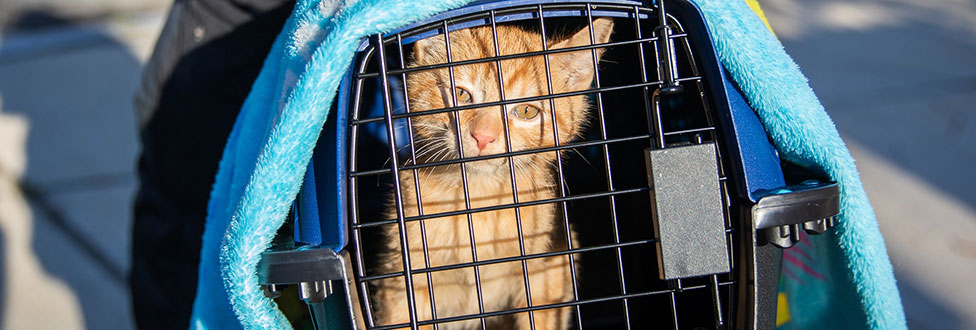May 14 is National Disaster Animal Preparedness Day!
Follow these 6 steps to be “pet prepared” during an emergency
In 2010 the Federal Emergency Management Agency (FEMA) designated the second Saturday in May as National Disaster Animal Preparedness Day, to help pet families focus on the importance of having a family disaster plan that also includes their pets.
Whether it’s a fire, flood, hurricane, tornado, earthquake, or other natural disaster, emergencies happen. Just as you’ve created an “in case of emergency” plan for your family, it’s smart to do the same for your pet. Keep in mind that what’s safest for you is typically also what’s safest for them.
Not sure what to do to prepare for an emergency? First and foremost, be sure to prepare a pet emergency bag. Keep it handy in case you need to evacuate your home in a hurry. Take a look at ARL’s list of supplies that your pet will need.
- Include pets in your family emergency plan. Pre-determine how you would transport your pet in an evacuation and which boarding facility, shelter, friend, or relative would be able to take in your pet if necessary. Designate a neighbor to check in on and/or evacuate your pet in the event that you are not home when an emergency occurs. Display a notice in a visible part of your front door or window advising what pets live in the house.
- Take your pets with you. If you need to evacuate your home, don’t leave your pets behind. Leaving an animal home alone could be dangerous, especially if it may take days or even weeks for your family to return to them.
- If it’s safe for your family to stay at home, keep pets confined. Pets should remain indoors at all times. Keep pets separated in their own quiet space with plenty of accessible water.
- Make your pet easy to ID. If you become separated from your pet, you’ll want to try and claim them as quickly as possible. Make sure that all identification tags are up-to-date and secured to your pet’s collar. Microchipping your pet is always a good idea and a fail-safe way to verify that you’re their owner. Also, keep a photo of you and your pet together handy to help others easily ID them.
- Vaccinate your pets. Protect your pets from potential disease and illness in the event that you need to leave your pet at a boarding facility or shelter.
- In the few days after a disaster, keep your pets indoors. Unfamiliar scents and sights may cause worry or confusion. Downed power lines, broken tree limbs, and displaced wild or domestic animals may pose a risk to your pet.
If an animal is in imminent danger, contact your local Animal Control Office or Police Department for possible assistance, as they may have quicker access to an emergency scene.

